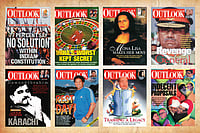Thinking that in us they were mistaken
That we sit sometimes by the wayside brook
With mischievous vagrant seraphic look
And wonder if we cannot feel forsaken
THESE lines from Frost serve well to describe the angst of that sexual minority variously and pejoratively dubbed gay,chhakka, homo, nancy boy, fairy, laundey baazand worse. Angst-ridden they still are. But guilt/shame ridden they certainly are not anymore believing like Genet that anatomy is not destiny. This then is the new unapologetic stance of a long marginalised, recently politicised community. And this, the first - ever anthology of gay writing from India, its most striking public manifestation.
Hoshang Merchant wears many hats: poet, teacher, writer, editor. To his credit he wears them elegantly and well. His preface offers insight, his writing plumbs depths, his selection holds up a veritable prism to the seemingly alien other/netherworld that we realise with a shock is peopled by people like us. Not people with tails and horns: this anthology features everyday men. People you know, pass by, meet everyday: fathers and brothers, masons and mechanics, husbands and nephews, friends and farm hands, grocers and grand uncles. People that had as much choice in choosing their sexuality as "a Negro does in choosing his colour" as Genet wrote famously once.
This anthology tells their story. It's an unrelenting gaze writers as diverse as Vikram Seth, Rakesh Ratti, R. Raja Rao, Bhupen Khakhar and Frank Krishner fix on the meetings and the matings, the horror and the hypocrisy, the sadness and the sensuality, the abandon and the absence that in forms gay lives. Not prettified soft focus Chien Win Lee. This is brutally direct, merciless no-holds-barred Sebastio Salgado vision that destroys artifice, disallows subterfuge. Khakhar throws open the Pages from a Diary: men meet and mate here. But amidst all that meat is a mind that somehow ennobles, infuses with dignity, even tenderness, what is essentially a primal carnal rite. There are sexual schizoids like sexy, silly, willing-to-wound but fearing-to-strike Khalid, who Rao delineates with bemused pen in Moonlight Tandoori. Unforgettable Khalid! One orifice spouts the scriptures, the other begs entry into Saturnalia. The old professor waits, watches, wins and leaves resigned, indifferent, as the inevitable denouement unfolds. Khalid clings to his "unknowing", the departing older lover to cherished moment that will soon be memory. The doomed emotional dialectic of Gay Eden.
It's the same vision, call it harsh, direct, even wistful but never cloying, that writers like Krishner bring to their stories. His The Sweetest of All is about the best document of the rollercoaster bittersweet ride that's the average gay boy's life. Beautiful boy head over heels in love seeking sex change in response to if-only-you-were-a-girl refrain of macho lover being cautioned by surgeon—" If he's so keen on women what's he doing in your bed?" He loves on. Learns about double-dealing, self-deceiving lovers. Some leave troubled by religious guilt, others with equally cavalier nonchalance to sire children to whom they want him to be uncle. Mark, the protagonist , emotionally wise and old, knows, accepts, plays along. He'll keep old memories. And new men. After all, isn't the next man and moment "the sweetest of them all"?
This collection doesn't solicit your sympathy. Only empathy. Towards larger issues: gay rights, gay rape, the right to be free, to be oneself. Not sexual questions alone, but political ones. About people. Like you. People that like the two male lovers in Seth's Golden Gate wonder how God or anybody else would mind "My touch, your trembling , our caresses/the loving smart in your clear eyes/ My hands ru ffling your hair, our sighs?/If any thing, I'd say he blesses/The innocent bodies that express/So forthrightly such happiness." The issue's not about freaks but sons and lovers that wonder like Ratti, "How can I find the love I seek/And still remain your child?"


























